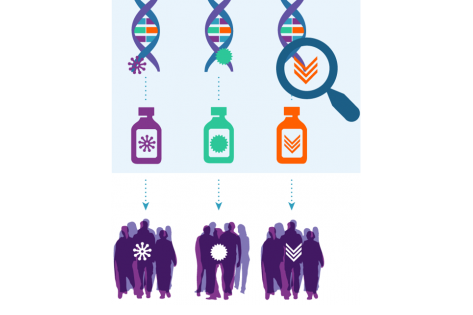
ECOG-ACRIN and PrECOG Research at ASCO 2023
June 30, 2023
Game, Set, (NCI-)MATCH
June 30, 2023Trial Spotlight: Curtis Pettaway on EA8134/InPACT, the International Study for Patients with Advanced Penile Cancer

Phase 3 Randomized Trial of Inguinal Lymph Node Dissection Surgery Alone or After Chemotherapy With or Without Radiation Therapy for Patients With Advanced Penile Cancer
 By Curtis A. Pettaway, MD
By Curtis A. Pettaway, MD
Cancer of the penis is a rare disease, with fewer than one case per 100,000 men diagnosed annually in developed countries like the United States and the United Kingdom; as such, a limited body of evidence exists to guide treatment decisions. Locoregional lymph node status is the most clinically significant prognostic factor, and risk of recurrence and mortality are directly related to inguinal disease burden.
The 5-year survival rate for patients with a single involved inguinal lymph node is approximately 80%, whereas for patients with pelvic node involvement (N3), reported 5-year-survival statistics range from zero to 12%. Although recent years have seen a number of developments in the management of penis cancer, a more cohesive approach is needed.
The phase 3 trial EA8134, also known as the International Penile Advanced Cancer Trial (InPACT), aims to determine the optimal sequencing of surgery, chemotherapy, and chemoradiotherapy in patients with squamous cell carcinoma (SCC) of the penis who have inguinal lymph node metastases (locally advanced disease).
InPACT is divided into two parts: InPACT-neoadjuvant and InPACT-pelvis. In the neoadjuvant portion, patients with locally advanced SCC are stratified by disease burden and randomized to one of three arms: (1) surgery to remove the lymph nodes in the groin; (2) neoadjuvant chemotherapy followed by surgery, or (3) chemoradiotherapy followed by surgery. After their surgery, lymph nodes of all patients in InPACT-neoadjuvant will be examined by a pathologist; patients for whom there is a significant risk of the cancer recurring will have the opportunity to enter InPACT-pelvis. Patients for whom there is a low risk of the cancer recurring will have follow-up visits with their doctor for five years following the treatment start date.
For the InPACT-pelvis part of the study, patients at pathologic high risk will be assigned to one of two options based on whether or not they have received chemoradiotherapy. Patients in the first group (no chemoradiotherapy) are randomized to either chemoradiotherapy or prophylactic pelvic lymph node dissection (PLND) followed by chemoradiotherapy. Patients who have already received chemotherapy will be randomized to either surveillance or PLND.
The primary endpoint for all EA8134 trial participants is overall survival. Researchers hope that the InPACT study will shed light on a recommended sequence for the interventions being investigated, as well as an outcome-related evidence base upon which to test newer interventions, including targeted therapies.
InPACT recently reached its 100th patient milestone, the largest number of patients ever recruited to a single prospective clinical trial in this disease space. The study teams behind this work here in the US and in the UK encourage additional regional sites and countries to join the study in the coming year and help reach the accrual goal of 200 patients for this potentially practice-changing trial.
Learn more about the InPACT trial at ecog-acrin.org.
Dr. Pettaway (MD Anderson Cancer Center) is the ECOG-ACRIN chair for this International Rare Cancers Initiative study in the United States with sponsorship from the National Cancer Institute.
Philippe E. Spiess, MD (Moffit Cancer Center) is the ECOG-ACRIN study co-chair.
Steve Nicholson, MBBS is the InPACT study chair in the United Kingdom, where the trial sponsor is the Institute of Cancer Research.
![ECOG-ACRIN logo[19516]275×75](https://blog-ecog-acrin.org/wp-content/uploads/2021/03/ECOG-ACRIN-logo19516275x75.png)
